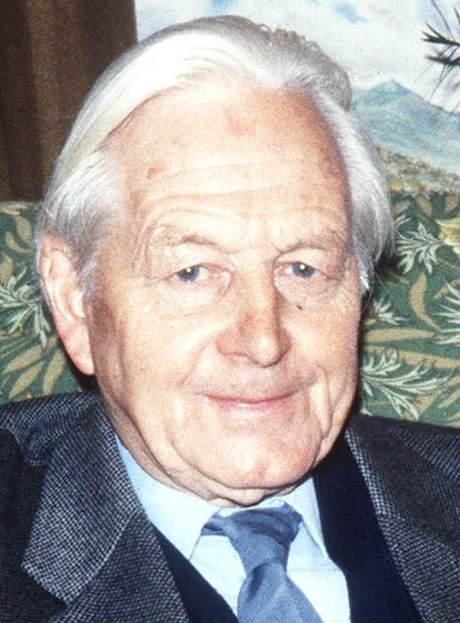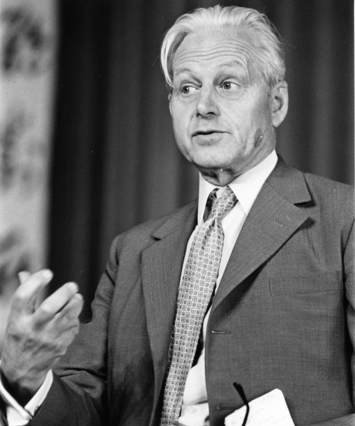R.C. (known as 'Robin') Mowat was a historian who saw the world from a spiritual and, indeed, prophetic perspective. Through his eleven books, he sought to discern the cultural or civilizational struggles in history, particularly in twentieth century Europe and the Middle East.
Robin Mowat was born on 11 May 1913 in Oxford. He attended the Dragon School, Oxford, and Marlborough College, before going up to Hertford College, Oxford in 1931 to read history. History was very much in the family; Mowat's father, R.B., was appointed Professor of History at Bristol University in 1928, and his brother, Charles, became well-known for his work on twentieth century Britain. As a student, Mowat himself won the Gladstone Memorial Essay Prize in 1934 for an essay on 'Mr Gladstone and the Oxford Movement'.
At Oxford Mowat was intrigued by socialism, and impressed when the hunger-marchers passed through Oxford in the autumn of 1932. However, he increasingly believed that society's problems needed a spiritual solution, and was drawn into a life-long involvement with the Oxford Group, subsequently called Moral Re-Armament and now Initiatives of Change. Mowat saw the Oxford Group as a 'method of trying to live the Christian life', and was struck by its emphasis on personal change as a key to national change; he once said that its slogan 'new men, new nations, a new world' was the best piece of logic he had heard since he came up to Oxford.
After leaving Oxford, Mowat taught at Radley School near Oxford, in Dortmund, Germany as an exchange student, and at Clayesmore School in Dorset. During the war, he worked at the Middle East Intelligence Centre at G.H.Q, Cairo, and he served with the British Military Mission as Lecturer in the Middle East at the Egyptian Staff College. From 1947-1958, he was Senior Lecturer at the Royal Naval College, Greenwich, and from 1958-1963, he taught at the University of Ibadan in Nigeria. From there he moved to the Oxford Polytechnic (now Oxford Brookes), where he became Head of the Department of Arts and Languages at a time of rapid expansion. At the 'Poly' Mowat was a keen advocate of excellence in teaching; he organised residential weekend courses for students, as well as initiating exchanges with continental universities. He retired in 1978.
While still a student, Mowat had been inspired by studying the philosophy of history. His outlook owed a lot to Arnold Toynbee, and he was also influenced by Albert Schweitzer. He believed – and it was the context for most of his writing – that the West was in a crisis; although it was technologically advanced, it was morally decadent and in need of spiritual renewal. He worried about the decline of family life and erosion of absolute moral standards on which he believed civilization depended. Change was possible, though; influenced by Toynbee, Mowat believed that renewal in history was normally brought about by the influence of 'creative minorities'. These ideas were evident in a series of books: Climax of History (1951), Decline and Renewal: Europe Ancient and Modern (1991), Modern Prophetic Voices (1994), and Spiritual Forces in International Politics 1998). Discussing Modern Prophetic Voices in The Times (26/4/1994), William Rees-Mogg described Mowat's call for prophetic intervention in modern society as 'very persuasive'.
The focus of much of Mowat's writing was Europe. Probably his most well-known books were Ruin and Resurgence, 1939—1965 (1966), and Creating the European Community (1973), the latter being a regular item on undergraduate reading lists. Mowat believed that post-war European reconstruction was the work of a creative minority of spiritually-minded people. He noted that many of the shapers of the European Community (men like Adenauer, Schuman and de Gasperi) were people with strong religious convictions, their ideas drawing on Continental Protestantism, radical Catholicism and Anglo-American evangelism. Influenced by his own experience, Mowat also took the view that the post-war conferences in Caux, Switzerland, organised by Moral Re-Armament, had played an important role in making European, particular Franco-German reconciliation possible.
As well as Europe, Mowat was greatly interested in the Middle East, and the growing dialogue between the religions. He met his wife Renée, who was from the Egyptian Jewish community, while he was in Cairo; she was in the Women's Auxiliary Territorial Service, and they were married in a military wedding in 1942. His Middle East Perspective (1958), in which he sought to convey a 'sympathetic understanding of the peoples and nations of the region', was followed by his D.Phil. on 'Lord Cromer and his Successors in Egypt' (1970); and he was also involved in a charitable initiative called the British-Arab University Association.
Between 1991-2004, Mowat and his late son David ran a small publishing house called New Cherwell Press, which published a succession of personal testimonies on the spiritual life, as well as some studies of international conflict; some of Mowat's own books were published there.
Mowat's account of the Mowat family in the 1930s, An Oxford Family Remembers (2002), is full of delightful vignettes: in May 1941, on a ship going to Durban, Mowat offered lectures to staff officers and their men covering the Crusades, the French revolution and Napoleon, as well as contemporary Europe; 1956 found him trying to build bridges of understanding with Egyptians during the Suez crisis; and in 1967 he was teaching English to primary school children on the Gilbert and Ellis Islands while visiting with his family. Mowat had wide interests: he loved music and was also a gifted painter.
Mowat sometimes gave the impression of absent-mindedness. He worried some his friends by insisting, well into his 80's, on bicycling through Headington, Oxford, to collect his pension. Thankfully, Renée brought common sense and a gift for hospitality to what was a very attractive partnership. The Mowats were united in spirit and aim, and their house was a haven for students, colleagues and friends over a number of decades. Visitors were welcome, and there was always a good supply of tea and cake to lubricate the wide-ranging discussions that were a feature of the home.
The Mowats had two sons and three daughters. Mowat is survived by Renée and four of the children.
Robert Case Mowat, historian: born 11 May 1913, Oxford, died 1 April, 2006, Oxford.
This article first appeared in the Independent on 12 May 2006.
by Philip Boobbyer
(School of History, University of Kent)
English


